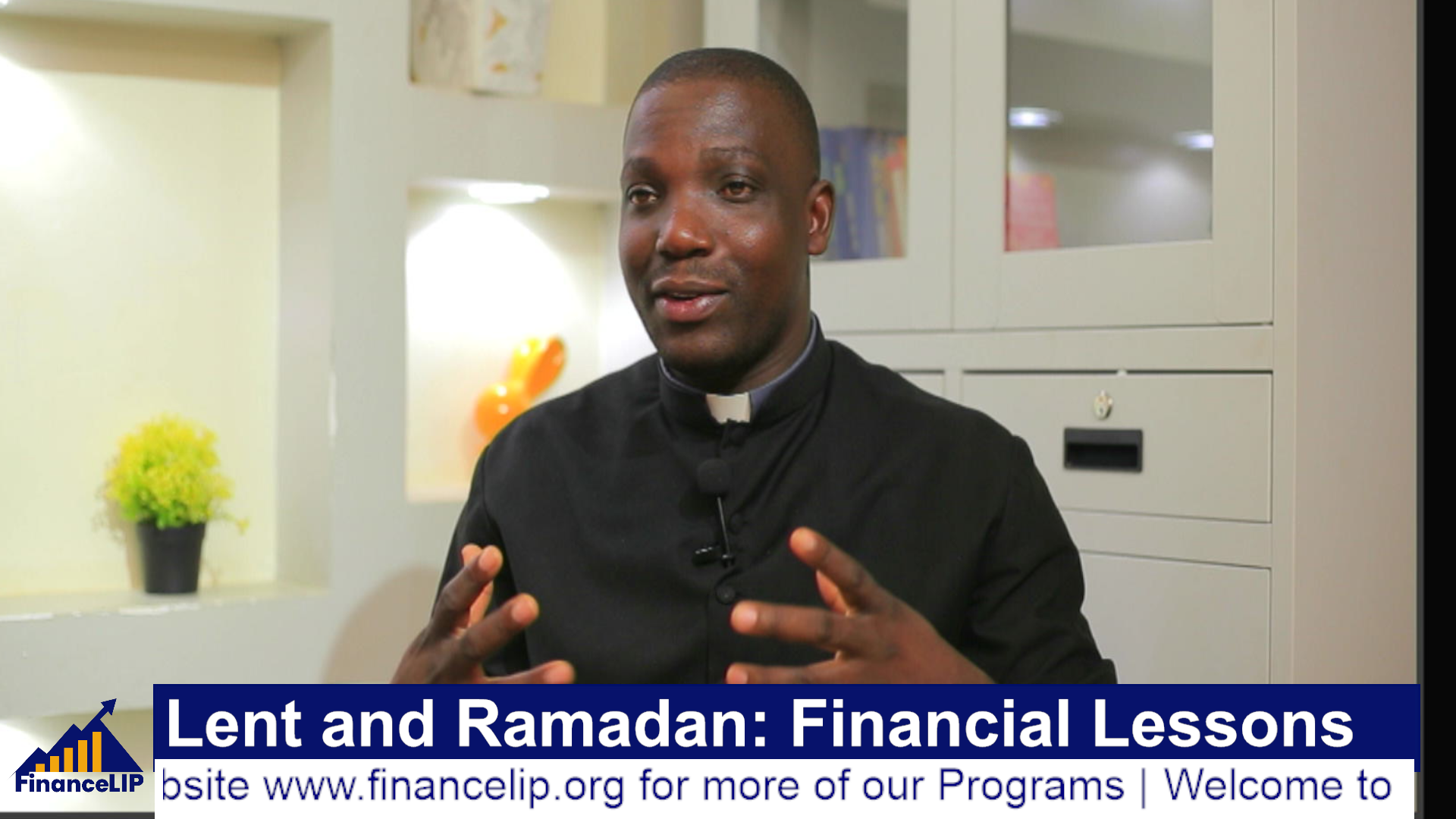Currently Empty: UGX 0

In the Outright Financial Matters Webinar, held on the 11thMarch 2025, Rev. Fr. Deogratius Kiibi Kateregga reflected on Lent and Ramadan Financial Lessons. Here are some of the highlights from from the discussion.
There is urgency to recognize the power in your ability to attract, effectively use, grow and protect whatever small or big income wisely. The period of Lent and Ramadan offer us lessons on how to behave and relate with money.
Just like Andrew Carnegie, once said “all of us are born with the potential to be rich, but not all of us will become rich.” Fr.Kiibi, echoed that we all have the capacity to create wealth, yet not everyone of us will achieve it.
Many people say, “God forbid,” but there are countless things God has forbidden, hence a calling to pay attention to certain things daily, Rev. Fr. Kiibi called them tendencies, or inclinations namely:
- Consumerism: Most people every bit of money that comes in, you consume—eating, drinking, and spending relentlessly. When you have money, you’re restless, unable to find peace until it’s all gone. We must guard against this tendency of consumerism.
- Materialism: Many people amass stuff—multiple phones, cars (more than two), clothes, and shoes. Causing laughter, he said, many shoes as if they have the legs of octopus. We must beware this pull down tendency to materialism.
- Entitlement: People feel they deserve certain things. Take, for example, someone saying, “I’m an orphan, so I’m owed something.” The entitlement mentality denies us the ability to compete and survive.
He emphasized that what makes billionaires isn’t how much money flows into their pockets but how they manage the resources they possess (skills, time, technology, money etc).
He noted that money is tripartite—it has a soul, a body, and a spirit. The body is the paper or coin. The spirit, is called Mammon, an evil force that tempts you to squander money or opportunities. And the soul being the value of money, calling upon you to understand the worth of money.
Did you know that every penny carries the perspective of the past, present and the future? In terms of the past—what you have already spent on, —your present obligations, such as meals, school fees or loans, and your future projected expenses such as planned house construction or education for your children. Noting that when you get money today, you can’t be sure you will get more tomorrow. So, manage your finances carefully—make money, yes, but above all, use and multiply it well.
Lent and Ramadan should remind us to pursue: personal goals as individuals, career goals as professionals, and social contribution goals. The attention to the three goals should drive us to manage money wisely— alerting us not to commit crimes against money.
He cautions that “money” knows us well, remembers the crimes we have committed against it, and may get annoyed, hence not getting near you because of how you related with it in the past. This is why people end up poor and turn to the church for financial breakthroughs. But church and prayer are not the master key. Prayer is for— God’s guidance to show you what you can do.
Lent and Ramadan must remind us to hold onto some money, knowing we’ll need it someday. If you’re earning well now, remember: money won’t always flow in that way. That’s why we urge people to work for money while still young, then use that money to work for you later—when you are old but also to prepare for holidays, layoffs, retirement or unexpected breaks. You are advised to use what comes in now to secure your future.
The Financial Vices
A vice is a habit we repeat over and over again. There are four financial vices;
- Consumerism—people tend to consume everything when money is earned or attracted. Perhaps because many of us grew up in villages with parents who gave us little pocket money, surviving from scratch, we crave for more and more once we start earning. But when that income is earned, we perhaps don’t know what to do with it. That’s why consumerism tops the list of vices—consuming everything without a thought for tomorrow, especially among employees. A Nigerian pastor once defined an employee as “a corporate slave with titles but no entitlements.” Over 80% of people in third-world countries pray for contract renewals every time they step into church. So, beware of the vice of consumerism.
- Materialism. When some people get money, they tend to buy everything—designer suits, excess shoes, unnecessary cars and so on.
- Entitlement—people believe in support and dependency on others, including their children or employer to an extent that without money from that source money—you are finished.
- Ignorance. Many people don’t read; they don’t seek knowledge resulting in a danger and exposure to three things: not knowing, not realizing you don’t know, and not wanting to know. He noted that if you are exposed to all the three, then, ignorance may be at its peak, — likely to plunge you into dire poverty.
These four vices can ruin your life, stay away from them.
How to Relate with Money
No amount of money is ever “enough”—it’s not your salary that falls short, but your awareness. We must tame your desires and how you relate with money to allow us to thrive even when earnings differ, yet we shop most of the things in same market.
He reflected on the six laws to we need to heed to in order to shape our financial lives:
- The law of financial intelligence: Read about money. Learn about it. Your earning capacity hinges on your learning capacity. Without knowledge, your income suffers.
- The law of delayed gratification: If you can’t afford an international school for your child, don’t force it. Work hard and smarter until you can afford it. Avoid committing crimes against money by choosing what you can manage.
- The law of multiple streams of income: If you are a salary earner, seek other sources of income.
- The law of savings: Save for tomorrow—save to acquire assets, save for the future. Set some money aside.
- The law of investment: Invest to multiply or grow your money, to ensure you have more later.
- The law of covenant compliance: Recognize that all money belongs to God’s kingdom. You’re a custodian. How you handle it matters—God watches what you do with it.
Amid desires, preferences, and temptations pulling you in every direction, you must live within your means. Too many people live beyond their means. Always choose what you can sustain. Avoid comparison and competition; just live within your reach. Some retirees have nothing because they saved and invested nothing. Without saving and investing, you may find it challenging to survive in future.
Financial awareness lifts us from ignorance. Seek knowledge always. In his book, 29 Desirable Rules to a Self-Driven Life, Fr. Kiibi expressed how he learned that billionaires read at least 50 books a year. In Uganda and many third-world countries, countless people languish in “salary slavery” out of ignorance—working for governments or institutions for over twenty years, working from dilapidated offices occupied by predecessors. Ugandans need to strive daily to escape that routine. Being an employee, he argues suits the young people—work for others for twenty years at most, then shift to self-employment. White-collar jobs kill more people than deadly diseases; the stress is suffocating them. Read, learn, join webinars, seek mentors—crave for guidance and act on advice to better yourself tomorrow.
Shaping Financial Lives of Young People
You are born alone and, at some point, you will stand alone. Start planning for your future with your first salary. In Uganda, we lack enough role models—many people retire as paupers or financial burdens, even those with once-admired jobs, begin begging the President for contracts and extensions.
Each of us is unique. In the book, The Road to Your Best Stuff, the wealthiest place isn’t oil fields of the Soviet Union, diamond mines of South Africa, nor Iranian mines—it’s the graveyard, the place of many unfulfilled dreams: hospitals never built, ideas silenced by fear. Zig-Ziglar said FEAR is False Evidence Appearing Real, in other wards, Forget Everything and Run, or Face Everything And Rise. You cannot afford to sleep as if you are competing with the dead, which too many people are doing.
Who will care for you in old age? After years with a company, what do you have?As an employee, look around: how many retirees from your firm have retired and are enjoying themselves? If you can’t name twenty of them, it’s a warning that you are likely to follow suit. We need more examples for the young people, not cautions. Start now—work, but plan for your future. For instance, do not produce children as if you are laying eggs, many children from different women. Money comes for a season; as you age, it grows weary of you. Do not commit crimes against it, and it’ll hide when you pray for it in church. Many plead for breakthroughs, but it’s too late. Plan early—you’ll need more money later than now.
People shout “fire, fire” of poverty in church, but poverty is man-made, defeated by hard work and planning—not shouting. If your business struggles, prayer alone won’t save it—God grants wisdom to your hard work and faith. When people enter your life and find you unprepared, they can’t help. In every venture, setbacks will hit but tough times demand resilience, patience, and perseverance. Problems will come but bad days build character. Quitters don’t win, be ready to face the exams life throws at you.
For business owners, stay involved—don’t abandon your ventures to only employees who only seek their pay. Businesses, like children, need your heart and presence. When the business weakens, analyze the source, persevere, and stay resilient. Setbacks are setups for comebacks, educating you for bigger challenges and opportunities, so, survive them.
Those who lean only on prayer during setbacks should heed this: pray as if all depends on prayer, but work as if all depends on hard work. Spending all day praying might scare God with your laziness! Many billionaires—have gone bankrupt, 75% are built from scratch—focus and rise again.
Wherever you are, adopt two mindsets:
- Survive: Endure hard times—bankruptcy, loans, lockdowns. Ensure you and your business outlast the storm.
- Be significant: When things collapse, don’t collapse with them. Stand firm, pinpoint the issue, and fix it.
Challenges test your stability. Survive them, and your business will trust you to carry on. Don’t give up—keep planning, thinking, and refining your approach.
Every day offers 24 hours—1,440 minutes, 86,500 seconds. What you do with them counts. By the time you grow old, people expect you to have something. Parents or grandparents with nothing become a burden to their children and grandchildren. Your position, power, and salary today aren’t guaranteed tomorrow—no contract renewal, no perfect health, no endless normalcy. Step out of your comfort zone and act.
God has blessed you—everything you hold is His gift. How you manage it is your gift back. Your business, office, or role isn’t yours—you’re a custodian. Others will follow, so, while you’re there, make excellence of your lifestyle.



